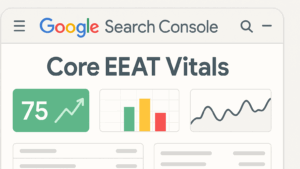The adoption of Artificial Intelligence (AI) by Search Engine Optimization (SEO), or AI SEO, ( or is it GEO or LLM SEO?), is still in its early stages, despite some advancements in certain areas, most notably content production. While AI has made substantial inroads in copywriting, there have been very few adoptions of AI in SEO – mainly because most LLMs are disconnected from real-world data and tools like keyword research. Also, most SEO strategies are tightly kept secrets and not publicly available – distinct from “high-level” SEO guides – and this lack of access prohibits LLMs from developing or presenting credible SEO tactics and strategies.
AI tasks in SEO are limited to
- Content writing
- Publihsing automation
- Internal Linking
There’s a large increase of AI in SEO pseudo-sciences like
- Keyword density/AI writing “optimization”
- Content breadth or coverage
- Tools like
- Jasper, Surfer SEO etc
- Tools like
PRedictably, the birth or awakening of AI via OpenAI’s ChatGPT launch ushered in a new ERA of “visionary” pundits to foresee the untimely demise of SEO much like the similar events on Twitter from the 2010s right up until the demise of that platform as X – but this underscores the deep lack of understanding of both Google and SEO and the refusal to acknowledge the preference of its user base. There is a lot of anti-Google sentiment – from jealousy to frustration behind this and it should be dismissed as purely as a hate ideology because it has no foundation or basis in data whatsoever.
Table of Contents
ToggleAI’s Current Role in SEO
Content Creation vs. SEO Strategy
The misconception that SEO and copywriting are interchangeable has led to premature conclusions about AI’s impact on the field. In reality, SEO encompasses a broader range of strategies and techniques beyond content creation.
AI’s Impact on Copywriting
While AI has significantly disrupted the copywriting industry, its application in SEO-specific tasks like title and meta description creation may be overemphasized. These elements, while important, represent only a fraction of comprehensive SEO strategies.
Practical Applications of AI in SEO
AI Posting and Publishing Automation
I see a lot of independent tools, SEO specialist tools and adopt of AI
AI Agent Task Automation
AI shows promise in automating certain SEO processes, particularly in content workflow management. However, the scalability of these solutions must be balanced against potential content quality issues. But there are some impressive AI integrations in tools like
- Zapier
- IFTT
AI micro-text Automtion
One area of content automation that I am happy to see is the over-rated and being area of updating Meta-Descriptions. Using AI for writing Page Titles (a critical part of SEO) is silly and dangerous – but as long as too many people focus on disastrous metrics like the length of page titles and meta-descriptions, this element of pseudo-science will always be with us.
- WordPress Plugins
- Yoast
- RankMath
- Hubspot
AI in Keyword Research
AI tools offer potential in keyword deduplication and grouping, though their precision often requires manual verification. SEMrush’s AI-driven Personalized Keyword Difficulty score represents a notable advancement in this area.
Debunking the “Death of SEO”
The advent of ChatGPT sparked numerous predictions about the demise of SEO, reminiscent of similar claims made during Twitter’s early years. These predictions often stem from a lack of understanding of SEO’s complexities and AI’s current limitations.
AI’s Limitations in Search Improvement
Contrary to popular belief, AI faces significant challenges in improving search functionality due to its inability to make subjective decisions effectively. This limitation underscores the continued importance of human expertise in SEO strategy.
Content Creation
The narrow capabilities of current Language Models (LLMs) limit their effectiveness in comprehensive content creation for SEO purposes.
AI Psuedo Seience
Some AI tools claim that their content is optimized and will perform better – these claims are nonsense. Because so much content is just opinion or observation, its beyond “research” or grading or developing an opinion. The many supporters of AI and Content optimization in general try to point to subjective biases like:
- Writing quality
- Grammar, spelling and stylisation – all things that have no basis in SEO
- Research
- Again – Google cannot do research, LLMs cannot do research
- Author bios can be faked
- EEAT
- This has been widely debunked but there are still people pushing these myths
I’v covered content quality and subjectivity and EEAT and will cover how LLMs cannot do research – like my post on how chiropractic are a debunked quackery yet LLMs have been fooled.
Google’s Stance on AI-Generated Content
Google does not explicitly penalize AI-written content. The search engine’s focus remains on content quality and relevance, regardless of its origin. Google’s own AI SEO tool, “Speedybrand,” further illustrates the company’s neutral stance on AI-generated content.
Google’s approach to AI content is pretty simple: “its content, it might work, it might not,”
Conclusion
While AI offers exciting possibilities for SEO, its current applications are limited and require careful implementation. The most effective SEO strategies continue to rely on a combination of AI-assisted tools and human expertise to navigate the complex landscape of search engine algorithms and user behavior.






